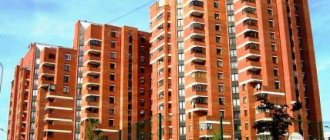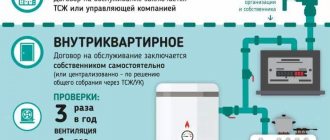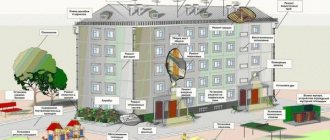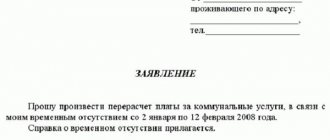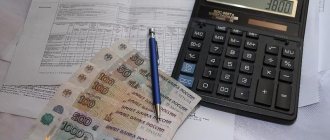Families or single citizens who experience financial difficulties in paying for housing and utilities can receive a targeted subsidy from the state. This right to a subsidy is established by Article 159 of the Housing Code of the Russian Federation. To qualify for benefits, a citizen must spend more than the established cost norm for housing and communal services in the region. According to the Ministry of Construction, in Russia already a quarter of the population provides such support.
In this material we will tell you who can apply for a subsidy, what conditions are important to meet, and where to apply.
Bankiros.ru
What the law says
The obligation to pay for utilities is assigned to citizens in Article 153 of the Housing Legislation[1], who own property that is connected to the system and serviced by the management company. This rule applies to all citizens who own a house or other real estate. Users are required to pay monthly, within the period specified in the contract. For late deposit of funds, a penalty is charged, which increases every day. And for a long delay, appropriate sanctions will be applied to the violator.
How is rent calculated and what does it consist of?
Utility payments include:
- Housing maintenance . This service applies only to apartment buildings and involves residents paying for the costs of caring for common areas in the house (basements, attics, entrances), which are connected to heating systems, lighting, require cleaning, etc. Residents of high-rise buildings are also required to pay for major repairs of the house and the labor of the people who manage this farm.
- Public utilities . This includes the supply of gas, water, heating.
- Payment of hire . This service is paid for by persons living in a municipal apartment that belongs to the state or a certain department.
Not everyone knows how rent is calculated: according to regulations or by area? So, according to the number of persons registered in the apartment, only part of the services is paid, namely:
- gas;
- water;
- electricity;
- waste water waste;
- garbage removal.
For example, there are 4 people registered in an apartment. If you did not have time to install metering devices (meters), then for the use of gas, water, sewerage, electricity and for garbage removal, you will be charged the amount according to the tariff and the accepted standard, multiplied by 4.
Amounts for other items (heating and maintenance of apartment buildings) are calculated based on the area of the apartment and the general consumption of services. Total consumption is calculated for all residential premises in the house, and then distributed to each apartment in proportion to the share of square footage in the total area.
On what area is rent calculated? Utility payments are calculated only from the area that is in use. Balconies, loggias, terraces and verandas are not subject to payment. The area of the premises involved in calculating payments for maintenance and repairs is taken from the technical passport of the residential premises.
How is rent calculated if no one is registered in the apartment and there are no meters? The absence of registered persons in the apartment does not exempt the owner from paying utility bills. If no one is registered in the apartment and no meters are installed, then the calculation is made for 1 person.
To avoid paying for unused utilities, install meters for gas, electricity and water. But you will still have to pay for housing maintenance services and general household needs.
What to do if a person is registered but lives at a different address? In order not to pay for it, take a certificate from the place of residence of this person confirming the fact that he paid for utilities at another address.
Submit this certificate along with your application to the housing office and all organizations providing services. After this, the payment amount will be revised. This procedure will have to be repeated every six months.
Temporary registration, just like permanent registration, affects the amount of utility bills (Article 155 of the Housing Code of the Russian Federation) . In this case, an additional agreement is concluded for the period of residence of the temporary guest in the apartment, which is valid as long as the temporary guest lives in the apartment.
The total amount of rent is calculated as follows: current tariffs are multiplied by indicators for consumed housing and communal services resources. Accruals are made in different ways: according to the readings of individual meters or according to common house metering devices. They determine the consumption of water, gas, electricity, and heat.
To calculate utility bills, the availability of benefits for residents is also taken into account. The type of apartment is also taken into account: communal, municipal, social, privatized. If there are no individual meters in the apartment, charges are made according to standards established at the regional level.
The standard is a unit of consumption of a housing and communal services resource by one resident . With this calculation, the volume of resource consumed does not matter; The number of officially residing citizens and the size of living space are taken into account. Standards are calculated in accordance with Government Decree No. 354 “On the provision of public services...”.
What is included in the communal apartment
One of the advantages of a separate house is that a person independently decides what services will be connected to his home. In an apartment, a person is obliged to pay for the repair and maintenance of common property, its maintenance and additional services. In a country cottage, the owner is responsible for the safety of the property independently.
So, if the roof leaks or the plumbing is damaged, the costs of repairing and restoring the damage will fall on one person. In addition, the tenant has the opportunity to independently warm up his home and refuse centralized gas supply.
What utility bills are basic in a private home:
- Electricity supply. The cost of electricity in a separate room is the same as in an apartment. The amount of the fee depends entirely on the tariff established in the region and the amount of energy consumed over a certain period of time. But the owner of the cottage can refuse electricity supply. Every year more and more people are installing solar panels or electric generators.
- Water supply. In suburban villages, people only have cold water connected. Accordingly, the monthly fee will be much lower.
- Sewerage.
The resources included in this list are connected to almost all citizens living in the private sector. The communal apartment also includes: hot water supply, central heating, gas, garbage removal.
The owner has the right to choose an expanded service or leave a list of resources that he really needs.
VS figured out how to pay for utilities in a cottage community
General or alien?
Andrey Stebakov* owned a plot and a house in the elite gated community of Nikolino on Rublevo-Uspenskoye Highway. Garbage removal, territory cleaning, checkpoint organization, etc. were handled by PZHK Nikolino LLC. Stebakov had an agreement with her, payment was monthly. For each of the houses in the village there was a payment of about 36,000 rubles. But Stebakov did not pay the money, and the company more than once went to court to collect the debt.
The Supreme Court told when utility debts will expire
In 2021, Stebakov unilaterally terminated the contract. The society sent him a new one two months later, but it was never signed. "PZHK Nikolino" went to court to collect debt on payments - unjust enrichment in the amount of more than 800,000 rubles, Stebakov filed a counterclaim - to collect overpaid funds and interest in the amount of more than 100,000 rubles. He justified the demands by the fact that all infrastructure facilities in the village do not belong to the owners of the households, but are registered as the property of CJSC Agroimpex and, in turn, are leased to LLC PZhK Nikolino. The actual owner must maintain the property, Stebakov noted.
Pay only for what you need
Stebakov indicated that he considers only such services as security, garbage removal, and road maintenance necessary; he pays for gas and water separately, and does not use the rest. He also noted that the quality of services leaves much to be desired - for example, in the village, despite security, thefts occur. Payments are not economically justified - they are greatly inflated. In addition, the applicant noted, the general director of PZhK Nikolino LLC officially receives 460,000 per month.
- The Supreme Court decided how much employers should pay for communal services
September 25, 11:10
Stebakov calculated that his share of the expenses, based on the number of houses in the village and the area of the plots, should be 1/422 of the total expenses, which is approximately 1,600 rubles. per month - almost 20 times less than what he actually has to pay (36,000 rubles). Stebakov indicated that he mistakenly transferred 126,000 rubles to PZHK, but from these funds only 38,000 rubles should be paid towards the utility bill, and the rest should be recovered as overpaid.
PZHK refused to voluntarily return the money. By the decision of the Perovsky District Court of Moscow, the claim of PZHK against Stebakov was satisfied, the required amount of more than 800,000 rubles was recovered from him, and the counterclaim was left unsatisfied. Two more authorities “reinforced” this decision. The courts did not agree with Stebakov’s arguments that he was ready to pay for the services he needed. They indicated that such a consumer position would lead to a violation of the rights of other property owners in the village. The absence of a contractual relationship in itself does not relieve Stebakov from the need to pay, three authorities concluded.
The Supreme Court pointed out the nuances
The Supreme Court did not agree with this approach (case No. 5-KG20-107-K2). The Collegium for Civil Disputes noted: in order to recover unjust enrichment, it must be established that the defendant acquired property or saved money at the expense of the plaintiff - this should have been determined in the case.
Stebakov said that the company arbitrarily set the price for services. But this is not a partnership or other community of owners, which would be subject to collective or individual agreements on the use of objects that actually belong, as the courts have established, to CJSC Agroimpex. The Supreme Court agreed that the owner bears the burden of maintaining the property, and the lower authorities did not appreciate this argument.
The Supreme Court indicated that in order to maintain a balance of interests of the parties, the court had to examine whether Stebakov needed the services in question, what were the connections between the costs of providing such services and Stebakov’s right to use the property, what he actually used, and also whether the costs of providing services were justified and reasonable. The lower courts did not pay attention to any of these aspects, the Supreme Court noted.
The Supreme Court sent the case for a new trial to the court of first instance.
Legislative gap and inflated tariffs
There is a huge legislative gap in the area of maintenance and payment for the use of infrastructure in privately built cottage villages, says Tatyana Grablina, lawyer at Land Law Firm Land Law Firm Federal Rating. group Land law/Commercial real estate/Construction group Dispute resolution in courts of general jurisdiction group Arbitration proceedings (medium and small disputes - mid market) group Private wealth management 23rd place By revenue per lawyer (less than 30 lawyers) 47th place By revenue Company profile. Often, when all private plots are sold, public lands, along with the infrastructure of the village, remain the private property of the developer. But the legislator has not provided for clear legal regulation of the status of such objects, and the right of private property is protected by law. As a result, the owners of infrastructure facilities have a huge field for manipulation and benefit from the current situation, notes Grablina.
The use of unregulated, inflated tariffs for utilities and the maintenance of the village’s infrastructure has more than once become the subject of disputes in the courts, says Grablina. The Supreme Court has already spoken out on this issue in case No. 4-КГ19-43 - the court supported the consumer’s arguments that fees for services cannot be arbitrary and not economically justified. The Supreme Court, in particular, noted that it is necessary to order an examination in the case and find out whether the tariffs are correct.
“An interesting conclusion of the Supreme Court is that if the obligations of a certain company to provide services are not legislated, the owners do not have the obligation to pay for them. Therefore, the most reasonable advice to owners, which will help them save money and nerves, is when buying a plot or house to pay attention to the legal regime and conditions for using infrastructure facilities,” warns Grablina.
*The names and surnames of the participants in the dispute have been changed.
- Irina Kondratyeva
- Supreme Court of the Russian Federation
- Civil process
Payment amount
Payments for utilities in a private house are made in the same way as in an apartment. At the end of the month, the payer receives a receipt indicating the amount to be transferred.
The total amount of the fee is affected by the meter readings and the tariff. If no one has lived in the premises for a long time, then you will not have to pay anything. If there are no special metering devices in the premises, you will still have to pay. The amount will depend on the number of persons registered in the residential premises. The cost may also be affected by the square footage of the house and its location.
If disputes arise related to the calculation and payment of housing and communal services, the parties have the right to contact government agencies.
Legislative norms
The rules and procedure for calculating the cost of utility services and the timing of their payment are established by such regulations as:
- Housing Code. Articles 153-154 of the Housing Code of the Russian Federation determine the deadlines for making payments and establish the obligations of the owner to make payments.
- The Civil Code establishes the procedure for concluding an agreement with the Management Company on whose balance sheet the apartment is placed in order to supply resources to ensure life in the premises and provide utilities.
- Government Decree No. 857 of 08/27/12. rules for the provision of utility services to owners and users in apartment buildings were approved. It also outlines the types of utility services, the rules for calculating and depositing funds by users and homeowners.
The Housing Code regulates payment issues:
- housing maintenance;
- rental of living space from municipal, official and state funds;
- utilities;
- contributions for major repairs.
The obligation to timely pay for utilities is assigned by law to the following subjects of housing relations:
- owners;
- employers;
- members of housing cooperatives;
- tenants.
Payment for utilities for residential areas built as part of shared construction is assigned to the developer before the purchase of the apartment by the buyer.
From what point is rent charged in a new building? The law clearly defines this date: the moment of signing the transfer and acceptance certificate by the owner. There are exceptions when the buyer is offered to sign an additional agreement obliging him to pay for housing and communal services 2-3 months before signing the acceptance certificate.
Property owners and tenants are required to make all payments by the 10th day of each month based on payment receipts.
The responsibility to inform citizens about accrued payments and the amount of debt is assigned to:
- organizations managing apartment buildings;
- settlement centers;
- resource supply organizations.
Housing and communal services tariffs and standards are regulated by local legislation, so the amounts in receipts for residents of different cities may differ even if the residential premises are completely identical.
The payment invoice contains a list of services that the user needs to pay for . Recommendations for calculating rent are approved by local authorities.
Regardless of whether the owner/tenant of the premises agrees with the amount presented for payment or not, he has the responsibility to pay the receipts on time.
Where to live is cheaper
Most believe that private accommodation is much cheaper. But this statement is controversial. Yes, utility costs are lower than in multi-apartment housing. But any home needs renovation. In apartment buildings, all owners collect money for repairs and maintenance. In the dacha sector, it's every man for himself.
Also, resources for self-heating are not cheap. But, living in remote settlements, a person can be absolutely sure that no one will flood him and that he will not have to deal with his neighbors because of property damage.
Therefore, there is no clear answer to this question. It all depends on your place of residence, tariffs, connected services, and more. By refusing additional services, the owner has the opportunity to significantly reduce utility bills at the dacha.
A person who owns real estate is obliged to fulfill the terms of the agreement concluded in the housing and communal services. And the main responsibility is the transfer of funds to housing and communal services. The total amount in the check does not depend on the type of property. But the cost is affected by location, square footage and the list of resources provided.
How to calculate your own rent?
Citizens can calculate their costs for electricity, gas and water supply independently, based on meter readings. To determine the exact consumption of these resources, it is necessary to record current instrument readings on a monthly basis.
By subtracting the previous indicator from it, it is easy to find out the volume of consumption for the month. The resulting figure must be multiplied by the established tariff. Residents who do not have meters pay for utilities according to standards multiplied by the number of persons registered in the apartment.
Standards can be set:
- Per 1 m² of total living space;
- For each person registered (permanently or temporarily) in the apartment.
The final payment amount is determined by multiplying the tariff by:
- the volume of resources used during the billing period according to the meter;
- standard for general living space (heating);
- standard and for the number of persons living in the apartment (water supply, gas supply, sewerage).
If the apartment building is equipped with a common building meter, then payment for utilities is calculated in the following way: the total volume of services consumed by all residents of the high-rise building is multiplied by the tariff and by the area of the apartment; the resulting value is divided by the total area of all premises of the apartment building.
You can calculate the amount of rent using modern programs. The most current software products include:
- HOA Assistant.
- Rent.RF.
- Info-Accountant.
- Infocraft housing and communal services 365.
- Debit Plus.
- 1C: Chairman of the HOA.
- 1C: Calculation of rent.
All these programs allow you to make calculations for free. They take into account discounts, rent benefits, debts and other nuances.
The penalty is calculated based on the refinancing rate (10%), converted from a percentage value to shares, i.e. 0.10.
Many owners are interested in the date from which rent penalties are calculated . We answer: according to the norms of the Housing Code of the Russian Federation, penalties are not charged for the first month of late rent. For the 2nd and 3rd months they are calculated using the formula: amount of debt * refinancing rate / 300 * number of overdue days.
For subsequent months, instead of 300, 130 is taken. The debt count starts from the 11th day and ends on the day of its repayment.
Who can apply for subsidies to pay for housing and communal services?
A citizen of Russia belonging to any of the social categories below can apply for payments:
- home owners;
- tenant of housing, including under a social tenancy agreement;
- members of housing cooperatives;
- foreign citizens who have permanent registration in the Russian Federation and belong to one of the categories above. If such an agreement is concluded between Russia and their state. For example, Citizens of the Belarusian and Kyrgyz Republics have the right to such a subsidy, because our countries have similar agreements.
Deposit “Valuable asset smart” Renaissance Life, Persons. No. 3354
to 10%
per annum
from 100 thousand
91 days
Make a contribution
In this case, an individual family or single citizen is entitled to only one such subsidy.
